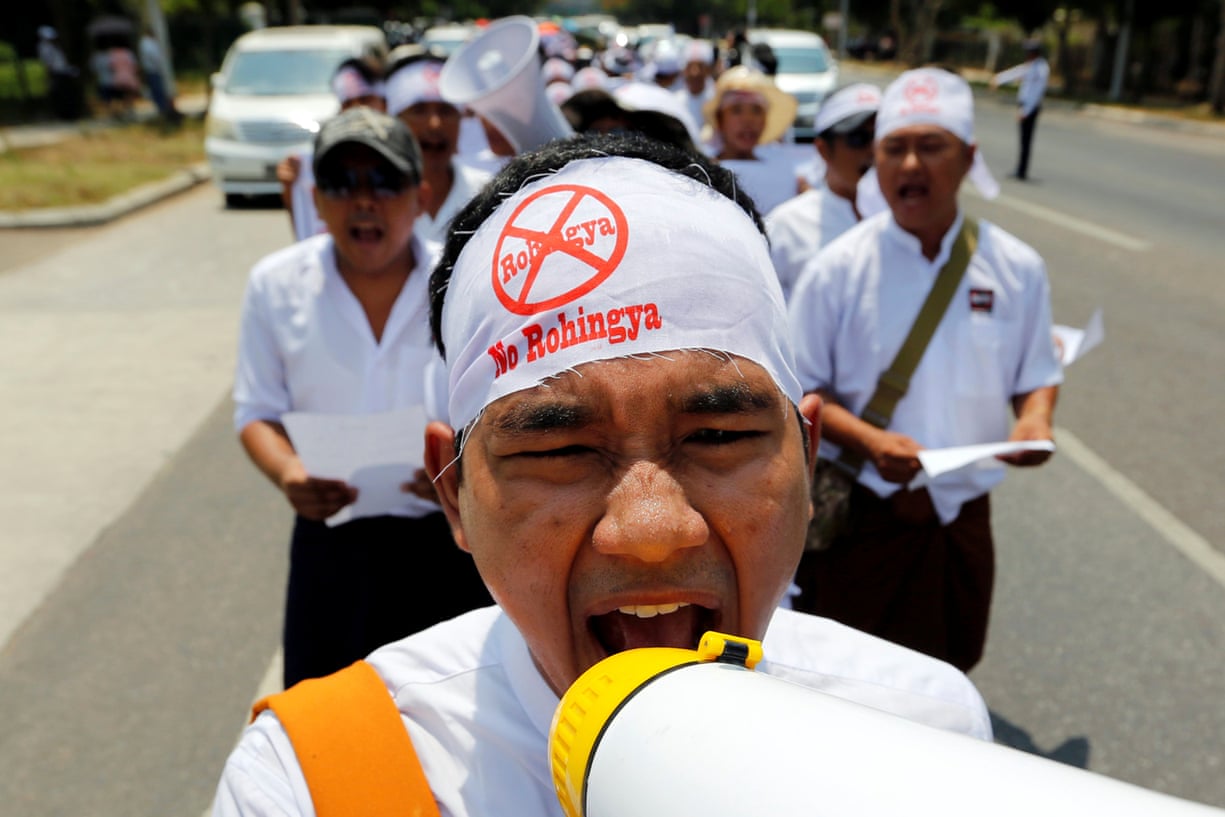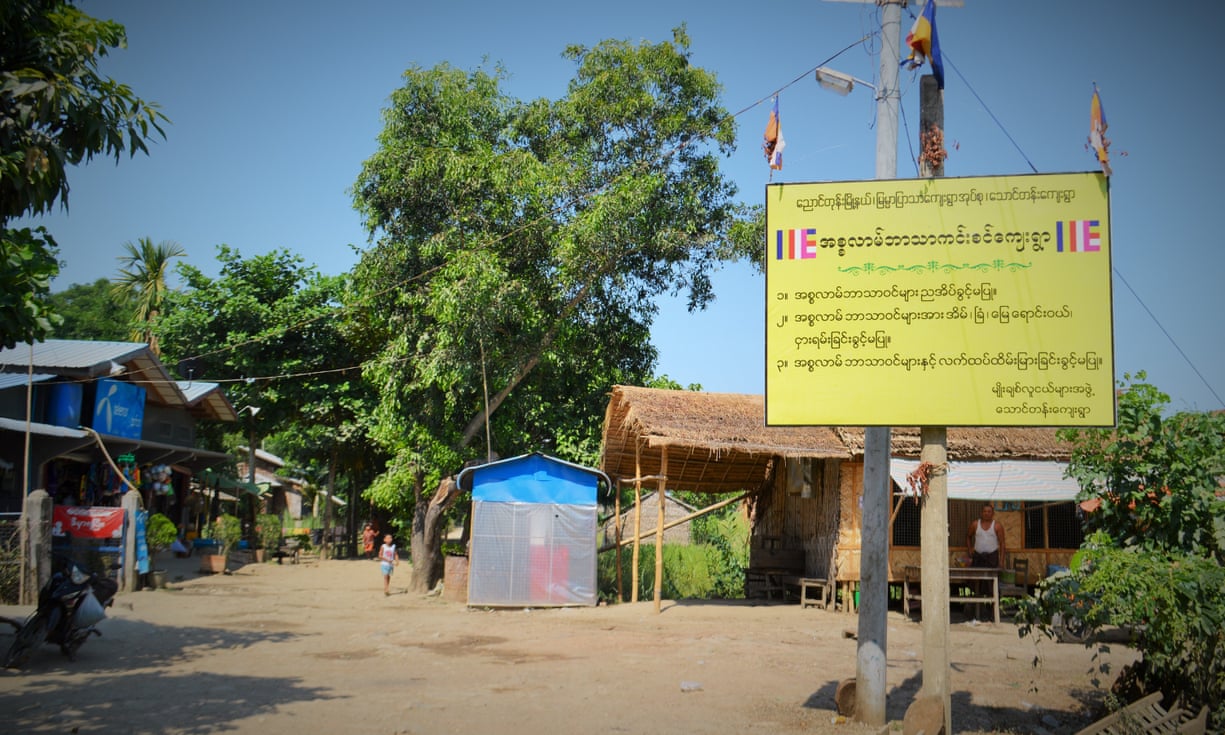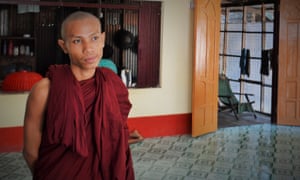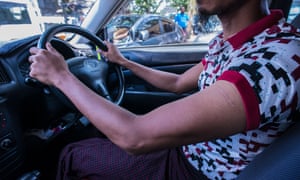The Rohingya, a predominantly Muslim ethnic minority from Myanmar's western Rakhine state, have been subjected to decades of persecution in the Buddhist-majority nation, culminating in massacres in 2012. The violence of that year was described by Human Rights Watch as a campaign of "ethnic cleansing," which involved "crimes against humanity" perpetrated by local mobs, at times with the support of state agencies. A 2015 report prepared by a team at Yale Law School for the NGO Fortify Rights found "strong evidence that genocide is being committed" against the Rohingya.
Myanmar's government confines more than 140,000 Rohingya, who were rendered homeless by the violence four years ago, to squalid camps. Across the state, basic rights such as freedom of movement and access to healthcare are severely curtailed by government measures, while apartheid-like conditions further limit the prospects of the group in the highly militarized northern Rakhine region.
Related: Backed By China, a Massive Narco-Army Angles for More Power in Myanmar
Stripped of their citizenship rights in 1982, the minority are among the world's largest stateless populations. Last year, their plight caught the attention of the international press when boats full of Rohingya and some Bangladeshi passengers were abandoned on the open seas by human traffickers, and mass graves of many of the same "boat people" were found in Thailand.
Perhaps the most damning charge contained in the cache of documents obtained by VICE News is found in a report commissioned by the UN to review the "human rights implications" of the world body's recent record in Rakhine state. The independent study, titled "A Slippery Slope: Helping Victims or Supporting Systems of Abuse?" and meant for an internal UN audience, concluded that the "situation in Rakhine state is forcing international institutions into complicity with systematic abuses" against the Rohingya, partly due to "excessive self-censorship" on rights.
The "current UN strategy of emphasizing development investment as the solution to the problems in Rakhine state," the study said, "fails to take into account that development initiatives carried out by discriminatory state actors through discriminatory structures will likely have a discriminatory outcome." In other words, pouring money into "development" without changing the government-imposed structures that oppress the Rohingya will not solve the problem. The paper added that such schemes are "aimed at mollifying" hostile populations that have targeted the Rohingya with acts of violence in the past.
The authors of the report, which is marked "confidential" and was prepared in late 2015, had access to a raft of internal documents, and they conducted private interviews with dozens of staffers from the UN and international NGOs. It is perhaps the most thorough internal review of the UN's Rohingya policy to date.
The findings of the paper are particularly damning in light of repeated internal warnings about the inadequacy of the UN response, contained in material seen by VICE News.
Watch the VICE News documentary Left for Dead: Myanmar's Muslim Minority:
A report produced by the Office for the High Commission for Human Rights or OHCHR, the UN's leading rights watchdog, in November 2014 observed that serious abuses such as "killings, torture, rape" were "ongoing," and called for "concrete action" to stop them, including the establishment of a UN-designed "human security" system which could prevent future atrocities.
A document from the same time, also obtained by VICE News and marked "confidential," contains the minutes of a meeting of the UN's "Senior Action Group," a high-level body including representatives from leading UN agencies and the Deputy Secretary General, Jan Eliasson.
The 2014 memo records that Eliasson "stressed the need to prioritize preventative efforts... [and] taking a firm stance on Human Rights Up Front," while a specialist within the organization identified "some risk factors associated with genocide" with regard to the Rohingya.
The UN established the "Human Rights Up Front" initiative in response to a damning internal inquiry into its failure to prevent mass atrocities in Sri Lanka during the end of the country's civil war in 2009. Launched by Secretary General Ban Ki-moon in 2013, the strategy "encourages staff to take a principled stance and to act with moral courage to prevent serious and large-scale violations" of human rights, and suggests a series of actions that can be taken to ensure this.
The "Slippery Slope" review paper, however, describes Myanmar as a near-rerun of the Sri Lanka crisis, albeit with very different circumstances. "[T]he dynamic of passivity and complicity with state strategies of abuse... is being repeated in Myanmar to an alarming level," it notes in its conclusions.
A section in the document that deals specifically with Human Rights Up Front lists the requirements set out by the initiative in a table, finding that the UN at the ground level had yet to properly fulfill its obligations in every single category.
Related: Myanmar Elects Aung San Suu Kyi's Aide as Its New President
An end-of-assignment report written by a veteran UN staff member who worked in Myanmar, leaked to VICE News by sources in the US, lays the blame for these failings largely at the door of the country's resident coordinator, or RC. The resident coordinator is the highest in-country role a UN official can occupy, and is comparable to a country's ambassador.
The end-of-assignment report, which takes the form of a letter directed at the author's former colleagues, notes that "I had to conclude time and time again that the RC discarded or simply ignored information that underscored the seriousness of the situation" for the Rohingya. It alleges that the coordinator instructed her staff to undermine other UN agencies that were taking a stronger line on Rohingya rights.
While the letter does not explain why the RC allegedly behaved in such a way, the "Slippery Slope" report observes that the UN country team led by the RC pursued a strategy that valued quiet diplomacy and the belief that "development investment itself will reduce tensions" in Rakhine state, an approach that drew criticism from other agencies in the organization.
The author of the end-of-assignment report goes on to allege in the letter that the Coordinator was insistent on pursuing the strategies she favored and would engage in "bullying, intimidating and discrediting people that had a different view."
'I was instructed to rewrite history'
At one point, the author claims that the RC told them "repeatedly to find out when the Head of OCHA [Office for Coordination of Humanitarian Affairs] and / or OHCHR staff in the country was NOT available... so she could organize meetings at that time without having to listen to [their views]," which did not agree with hers.
The ex-employee's end-of-assignment report also claims that attempts to uphold Human Rights Up Front and the establishment of a human security system as other UN officials had requested were "put in the bottom drawer," as "the RC did not review and/or release the information and analysis provided."
This allegation is seemingly supported by broader observations contained in the "Slippery Slope" paper, which noted that there had been a "failure to implement a system-wide protection strategy," an outcome that suggests a "lack of the kind of teamwork and collaboration demanded by Human Rights Up Front."
Related: Islamic Countries Are Blocking LGBT Groups From a UN Meeting on AIDS
The letter also referred to a "prevailing atmosphere of intimidation, non-accountability, and manipulation of information," which worsened in the aftermath of an alleged massacre in early 2014 near Maungdaw in Rakhine state. This event was likewise described in the "Slippery Slope" review as a turning point, which noted that "when the government disputed the facts and denied the massacre, the Resident Coordinator took a more cautious approach, no longer standing by the original allegation."
What followed this reversal, the official contends in the letter, was that OHCHR was effectively blamed for the "tense relation[ship] with the Government," due to its explosive claims of a massacre. This occurred, despite the RC's strong support for the OHCHR report which was privately retracted only after the publication came out.
"I was instructed to rewrite history," the author of the letter complained, referring to a "lesson learned" document drafted in the aftermath of the fallout over the massacre; a section of the piece which dealt with the RC's initial response was allegedly excised on the orders of the coordinator herself.
Watch the VICE News documentary Escape From Myanmar:
When the official confronted the RC about this, a threat was issued: they were told "never to raise this again with her or anyone else 'if you want to continue your career at the UN.'"
"The discrediting of OHCHR continued throughout 2014 and the truth was often distorted vis-à-vis senior officials," the former official further alleged.
Michael Shaikh, the author of an initial UN report into the alleged massacre, told VICE News that he stands by his work. In his view, the UN changed its position on the incident because it "prioritized its relationship with the government over the people that it was in the business of protecting."
Speaking to VICE News, Renata Lok-Dessalien, the resident coordinator referred to in the end-of-assignment report, denied allegations that the UN was failing to uphold human rights. "I don't think anyone has spoken out as loudly as the UN on rights violations," she said. In response to allegations of complicity in abuses, she added that there had been "absolutely no complicity whatsoever."
However, the claim on outspokenness over rights is contradicted by the testimony of a former senior-level UN representative. Tomas Ojea Quintana, special rapporteur for human rights in Myanmar until last year, recalled that Lok-Dessalien had asked him personally not to be so vocal on the issue of Rohingya rights, and even not to visit Rohingya displacement camps.
'Everyone became engaged with the crisis, but no one took overall responsibility to come up with a common vision of what needed to be done.'
"She advocated for another approach, which did not include a big focus on human rights but more on development and so on... her advice was not to be so outspoken or to visit Rakhine state," he recalled.
Other UN veterans feel that a critical focus on the actions of the in-country team is misplaced, and view failures at the central level in New York as far more significant. Charles Petrie, whose 2011 report into Sri Lanka helped spur Human Rights Up Front, and who was himself Myanmar's resident coordinator between 2003 and 2007, is among them.
"I see a lot of parallels with what happened in Sri Lanka," he said. "One of the the major problems then was the dysfunctionality of the UN system at the level of headquarters in New York. Everyone became engaged with the crisis, but no one took overall responsibility to come up with a common vision of what needed to be done. The same thing is happening in Myanmar."
Related: Ignoring the Facts, Australia's Immigration Minister Calls Refugees 'Illiterate and Innumerate'
A spokesperson for the office of the Secretary General of the UN in New York told VICE News that, contrary to some of the allegations above, "[t]he UN has systems in place that aim to respond effectively to serious human rights violations, as well as to prevent them," and that Rohingya rights abuses were a serious concern, adding "we have proactively spoken up on this issue both publicly and in our official contacts."
However, sources within the NGO community close to events, who wish to remain anonymous due to the risk to their careers, maintain that deep divisions remain over how best to deal with the crisis in Rakhine state.
Those sources also said that the organization has initiated what they called an internal "witch hunt" in response to the VICE News documentary Left For Dead: Myanmar's Muslim Minority, which featured some of the material cited in this story.
Follow Emanuel Stoakes on Twitter: @EmanuelStoakes




















 Young monk Ma Ni Ta pictured inside the monastery in Thaungtan village, Myanmar. Photograph: Poppy McPherson for the Guardian
Young monk Ma Ni Ta pictured inside the monastery in Thaungtan village, Myanmar. Photograph: Poppy McPherson for the Guardian